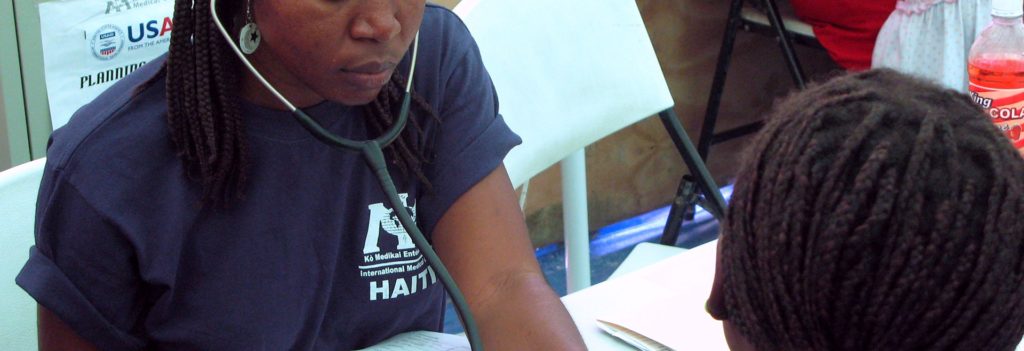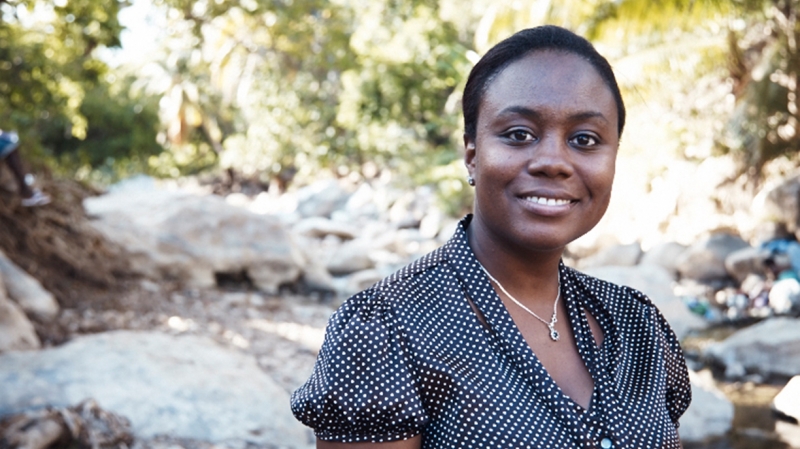“It’s like your heart is about to explode. Even now, three years later, you still feel the pain.”
In 2010, Dr. Virginia Chevalier was a young medical resident doing her hospital rounds in southern Haiti when, around 5pm on January 12, the earth started shaking. She remembers everything sliding beneath her feet and feeling like there was nothing to support her. She still feels the shaking, even today.

Virginia knew from an early age that she would be a doctor; she says it was written in the stars. Raised in Port-au-Prince, the second child of four, Virginia “saw everything”—Haiti’s extreme poverty, lack of health care and stark inequalities. It was “like hell,” so Virginia decided to do something to help. She earned her medical degree in Port-au-Prince and went south for her residency. Then the earthquake hit.
Within about six hours, the hospital where Virginia worked started receiving patients “without hands and legs; with broken eyes.” She still had two hands but wished she had more to carry everyone at the same time as they called out to her, “I need this. I am dying. Miss, please, nurse…” All the while, she couldn’t stop thinking about her family in Port-au-Prince. But there was no way to get in touch.
Words fail to describe what Virginia felt when she returned to the capital three days later, so she keeps repeating “very, very stressful.” Even being a doctor couldn’t prepare her for what she saw. Virginia walked for an hour on broken streets that “smelled dead” to reach her family home. At last, she found her parents, alive but too afraid to go inside their house. It was then that Virginia finally broke down and wept. Relief mixed with grief.
Life became entirely about staying alive. With no food, no water, no money, “You just try to survive.” Virginia willed herself to focus on the patients who came to her begging for help, but her mind was “without energy.” After two weeks, Virginia went back to work in the south. She and the other hospital staff treated patients outside under the hot sun as aftershocks went on for week. They were always on high alert; always ready to run. Everything felt like shaking—“You just keep wondering when something will happen again.”
Then life goes on, or it has to. But everyone in Haiti who experienced the earthquake that day, Virginia insists, still has a psychological impact. Even the survivors are “lost mentally because people cannot support the shock.” They think, “Why am I still alive? Why me? When I lost my family and my country is in ruins?” So, says Virginia, “You have to fight—with everything you have. Otherwise, you will lose your mind.”
When she finished her residency, Virginia tried to return to Port-au-Prince to be with her family. She applied to countless jobs in the city to no avail. Finally, one day, she had a talk with God: “Ok I’m ready to go where you want me to go.” She expanded her job search to outside Port-au-Prince and immediately received calls from several different non-governmental organizations, including International Medical Corps. After meeting with us, Virginia cancelled her other interviews. It just felt right.
According to Virginia, International Medical Corps saw more in her than she saw in herself. After one month, she became the supervisor of one of our sites, then another, and finally her work took her back to Port-au-Prince. Step by step, she became a manager: “I grew up with International Medical Corps. I learned so much.” Today, she does more capacity-building than clinical work, and although she sometimes misses contact with patients, she knows she’s “helping lay the groundwork for more.”
For instance, says Virginia, “If you work in a clinic, you may deliver a beautiful baby girl. But I get to fight for something else: to have more health facilities where women can give birth safely and hygienically; more trained OBGYNs; places where a mother can take her child if it has disabilities.”
Virginia also likes that “International Medical Corps does not come and try to decide what you need for you. They put national staff in the middle of the process and ask ‘What do you need? ‘How can we help the situation?’” She is proud to represent International Medical Corps at meeting with agencies like the United Nations and World Health Organization, but says her presence is “unusual” because “I’m female and a Haitian national.”
It shouldn’t be. Ultimately, the expertise of an ex-pat will come and go, but it’s Haitians who will stay. Says Virginia, “We will always be part of our country. It’s our country. And we have something to say.”
Today, Virginia believes that it was all “not for nothing.” She thinks that Haiti was “slipping” before the earthquake and then was “shaken to move forward”—to better understand “the lack” that existed and how to rebuild in a more equal and sustainable way. In the end, says Virginia:
“I think the earthquake brought something to us. We started to realize that the way we used to live was not correct, and that we have to integrate into the world. If every Haitian can think like this, I think that everything that happened to us will serve to progress us; to bring something different for the next generation. There is a lesson. We have to push to enter into life; to not be separate.”
And so, Virginia — and Haiti — pushes on.
